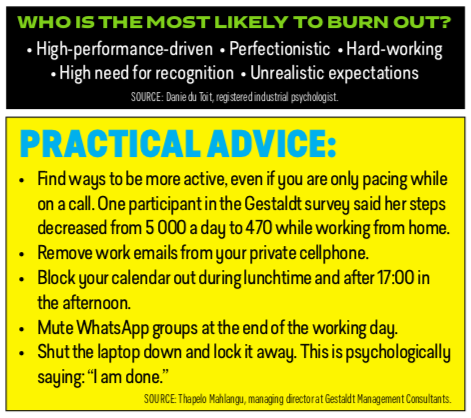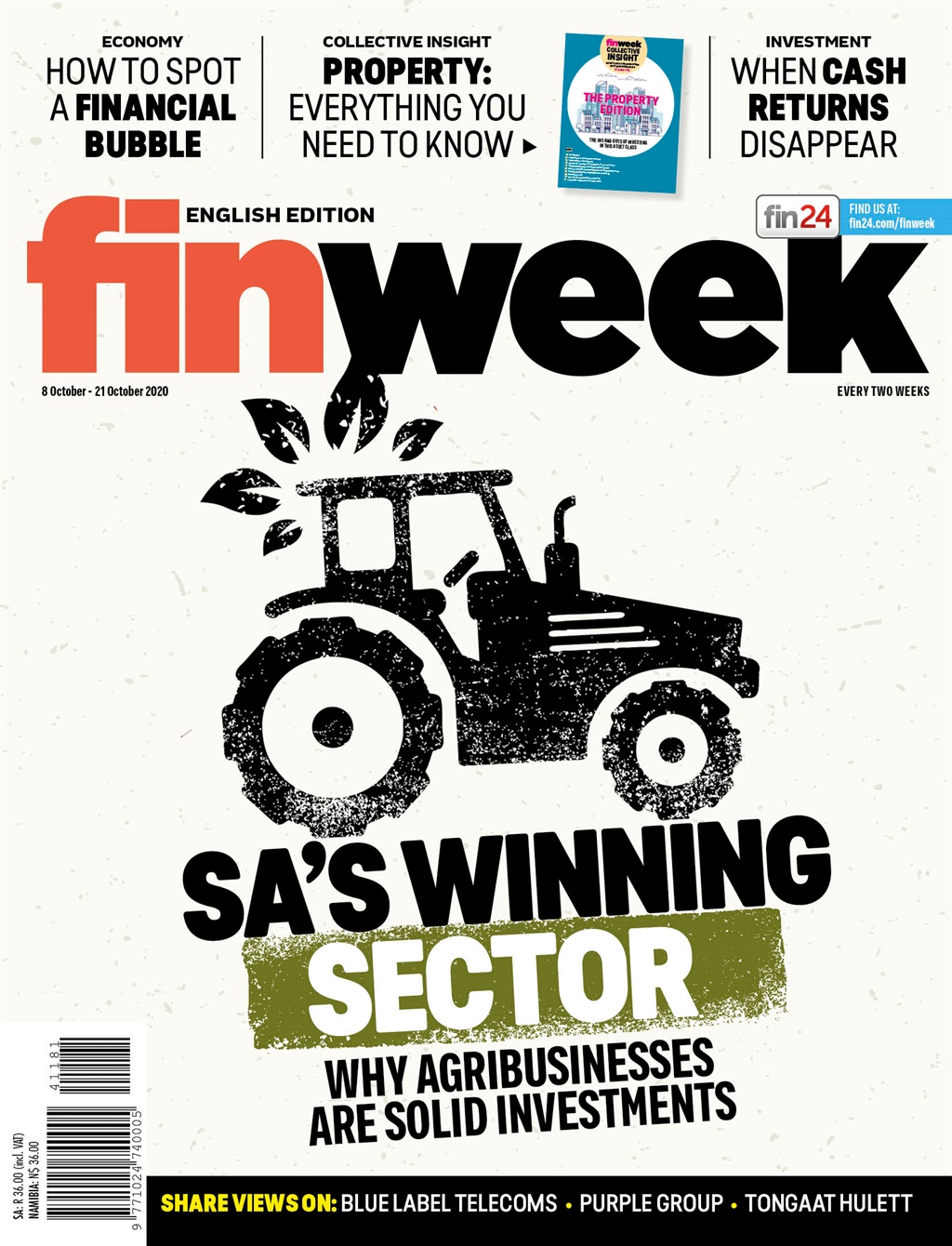
Changes to how people work amid the coronavirus pandemic are bearing down on their psychological well-being, which has implications for employers.
Most South Africans currently experience some form of distress – when there is no break from stress. Although it can be a positive energy that gets us out of bed and going during the day, the red flags shoot up when stress becomes distress.
The Covid-19 pandemic, prolonged periods of physical confinement and increased levels of anxiety pushed many people from being distressed to being burn out. The World Health Organization has reclassified burnout as an occupational phenomenon rather than a medical condition. This has huge implications for the workplace, says Danie du Toit, registered industrial psychologist.
The symptoms to look out for and to act upon include increased cynicism and depersonalisation, diminished efficiency, exhaustion, and a loss of emotional and cognitive control.
Stress, distress ... burnout
Renata Schoeman, a psychiatrist in private practice and head of MBA in Healthcare Leadership at the University of Stellenbosch Business School, says when stress becomes too much, too continuous, too intense and too frequent it turns into distress. “We then experience emotional, mental and physical fallouts from the stress.”
Distress over a continuous period within an occupational environment is considered burnout when it manifests as depersonalisation, reduced efficiency and severe mental and physical fatigue.
People who are burnt out feel disconnected from others, don’t feel like making small talk and start disengaging from their work. They struggle to concentrate and have somatic symptoms such as indigestion, sexual problems, chronic headaches and muscle tension.
Adri Albertyn, managing director of Maurice Kerrigan Africa, says they look at ways to identify burnout correctly as it is often misinterpreted. Top performers are often labelled as “they used to be good but have become disillusioned”, or “they are no longer able to be competitive”.
Organisations are “quite tough” on these “symptoms”, rather than making sure driven and ambitious people take the necessary breaks – either for a learning experience or some time just to do absolutely nothing, says Albertyn.
Schoeman has seen an increase in behavioural changes in people over the last few months – depression, irritability and eating or drinking disorders to “feel better”.
“The initial ban on alcohol led some good lifestyle changes. People were religiously trying to use the hours we were allowed to exercise, they refrained from alcohol and some even tried to stop smoking, although most people got their cigarettes on the black market.”
Gestaldt Management Consultants conducted a survey among their clients in the financial sector to determine the impact of Covid-19 and the lockdown.
Thapelo Mahlangu, managing director of Gestaldt Management Consultants, says the survey showed a significant increase in the number of people who responded that they “always” feel tired. One manager noted that when he asked his team how they felt before starting a meeting he was met with grunts and complaints about feeling exhausted and deflated. Being unable to energise them left him feeling helpless.
“Single parents and single women experienced it worse because their lifestyles changed dramatically. They became slaves to laptops,” says Mahlangu.
Dealing with it
The previous biggest stress people encountered was daily commuting and dealing with traffic. Suddenly, they were being faced with technological challenges and a complete lack of boundaries between work life and private life. Many also wanted to prove that they were productive and started pushing longer hours.
“When this overcompensation started to become a habit, we saw more and more organisations ignoring the boundaries,” says Schoeman.
Many people also felt they were working harder but achieving less. Du Toit says a senior manager acknowledged to his team that he had not been “himself” in the past two months. He asked them to rate him on a scale of one to ten in terms of the mistakes he had been making. He rated himself nine out of ten three months ago and seven out of ten recently. His team rated him nine out of ten three months ago, and three out of ten now.
“People who are burnt out just do not have the energy to check and double check,” says Du Toit. It is generally the family who first notice signs of burnout.
“The person can kind of keep it together at work, but at home the wheels come off.”
Mahlangu says their survey did not show an increase in people taking medication to deal with anxiety or depression. “What we learnt was that a lot of people were working with a ‘good bottle of wine’ close to them.”
The survey also did not show an increase in people requesting counselling. “What we are hearing, besides the wine, is that people are reconsidering their careers. This time has hit them so hard that they have discovered that they do not actually love what they do and that they need a change,” says Mahlangu.
Du Toit’s biggest concern at this stage is the level of anxiety most South Africans are experiencing. “We are permanently in a state of readiness. It is like running the 100m Olympics, waiting for the gun to go off to start the race, but the gun never goes off.”
Stress and anxiety are now intertwined. People stress about the day-to-day issues, but there is also increased anxiety about the future. “Unlike in the past, the anxiety is now sort of justified,” he says.
Treatment and recovery
Schoeman says by the time a patient has burnout symptoms, they fulfil the criteria for depression, an adjustment disorder or depressed mood, or an anxiety disorder. It should be treated as such by either a general practitioner and psychologist or by a psychiatrist who can prescribe the correct medication and therapy if needed.
It is rare that people need to be hospitalised, but she encourages people to see a psychiatrist for a proper treatment plan.
It would entail a session to see if someone needs medication. The most common medication would be a selective serotonin reuptake inhibitor or anti- depressant, which can alleviate symptoms in a week or two. The person may also need medication for sleep or anxiety in the short term.
It is crucial to get therapy that will give the person coping skills to deal with the situation that caused burnout and for better stress management, Schoeman advises.




 Publications
Publications
 Partners
Partners













